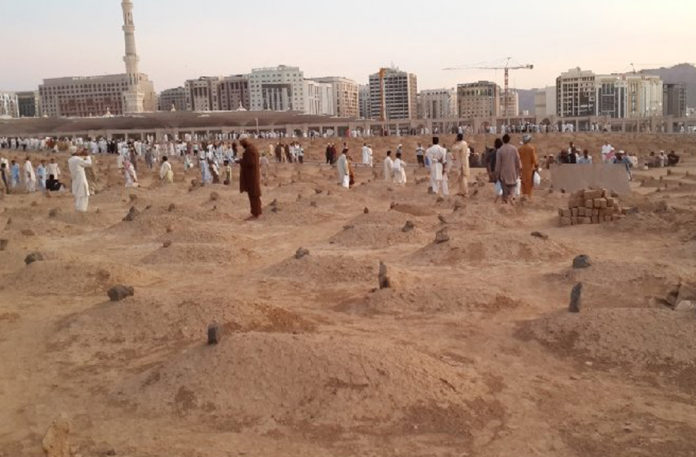All Praise is due to Allah, and may the salah and salaam be on Prophet
Muhammad, his household, the noble companions, and those who follow them until
the Day of Resurrection.
Ruling on Visiting Graves and Its Benefits
Visiting the graves is legalized for men, and the preponderating opinion is that it is
forbidden for women. In visiting graves, there are two benefits.
1) A lesson for the visitor It will help remind the believer of the Hereafter.
2) Seeking Allahs forgiveness for the
deceased
Scenarios of Visiting Graves
Visiting graves falls into the following categories:
1) Visiting the graves in order to call upon their occupants This is major shirk
and takes the person out of Islam.
Example: The visitor says,
| O so and so, I ask you to relieve me. |
2) Visiting the graves in order to invoke Allah by the gravesite This is in
principle an innovation; in addition, it can turn into a fitnah (affliction) for the
visitor. For instance, if Allah answers his request, he may think it was
due to the blessing of the graves occupant; however, we know the occupant
possesses nothing of this.
3) Visiting the grave to invoke Allah by the occupant This involves
putting the graves occupant as an intermediary between him and Allah;
this is unlawful and could become major shirk.
Example:
| O Allah, I ask you by the right of this occupant and the right of Muhammad upon you. |
4) Visiting the grave in order to agitate grief Shaykh al-Islam ibn Taymiyyah
said anything that agitates the affliction is from
lamentation.
Example: Whenever a person remembers his beloved ones (e.g. father,
mother, relatives, etc.) that have died, he visits their graves and this may fall
under lamentation.
5) Visiting the graves to invoke Allah for its inhabitants This is
permissible.
6) Visiting the graves for remembrance of the Hereafter and contemplation
This is permissible.
Therefore, only the last two scenarios fulfil the legal justifications for visiting the
graves, and both are recommended.
Visiting the Prophets Grave
Establishing a journey specifically for visiting the Prophets (may the peace and blessings of Allah be upon him) grave is forbidden;
however, establishing a journey to visit his masjid is permissible. If a person is
visiting his masjid and passes by his grave at which point he makes salaam, there is
no harm in that.
It is imperative to remember that there is a difference in legality between visiting the
grave of the Prophet (may the peace and blessings of Allah be upon him) and the legal visits to the rest of the graves. Other graves are
apparent while his grave is screened by three walls. It is because Allah answered
the Prophets (may the peace and blessings of Allah be upon him) invocation when he said,
| O Allah, do not make my grave an idol that is worshipped. (Shaykh al-Albaani, rahimahullah, authenticated it in Tahdheer al-Saajid min Ittikhaadhil Quboor Masaajid (pg. 24-26). |
Allah answered his call as it is being sealed and screened by these walls. The
people of knowledge, including Shaykh al-Islam ibn Taymiyyah noted, this
barrier is the reason why it is permissible for women to “visit” the grave of the
Prophet (may the peace and blessings of Allah be upon him), since it is shielded while others are apparent. Similarly, in normal visits
to graves, the person stands by the head of the deceased; however, this is not the
situation at the Prophets (may the peace and blessings of Allah be upon him) gravesite.
Etiquettes at the Prophets Grave
When a person stands by the grave of the Prophet (may the peace and blessings of Allah be upon him), one may say:
| Salaam be upon you O Messenger of Allah. I bear witness that you have delivered the message, fulfilled the trust, and advised the Ummah. |
It is not permissible for anyone to raise his hands by the grave, and worse than that is
to do so with his face towards it.
When the person finishes his salaam to the Prophet (may the peace and blessings of Allah be upon him), he should give salaam to the
Prophets companions, Abu Bakr: and Umar.
Women also may do the greeting since (i) this is a “following” of the preceding “visit”
and not an “independent one,” and (ii) they would be like the situation of passing by a cemetery where, according, to some opinions, they are allowed to great the grave
occupants. And Allah Knows best.
All Praise is due to Allah, and may the salah and salaam be on Prophet
Muhammad, his household, the noble companions and those who follow them until
the Day of Resurrection.
Footnote
Adapted from understand-islam.net
(NOTE: If you want to build a strong and powerful relationship with Allah, check out Islamia TV, where you can watch Islamic speakers from across the globe deliver inspiring and motivational courses. Learn more at www.islamia.tv.)





















